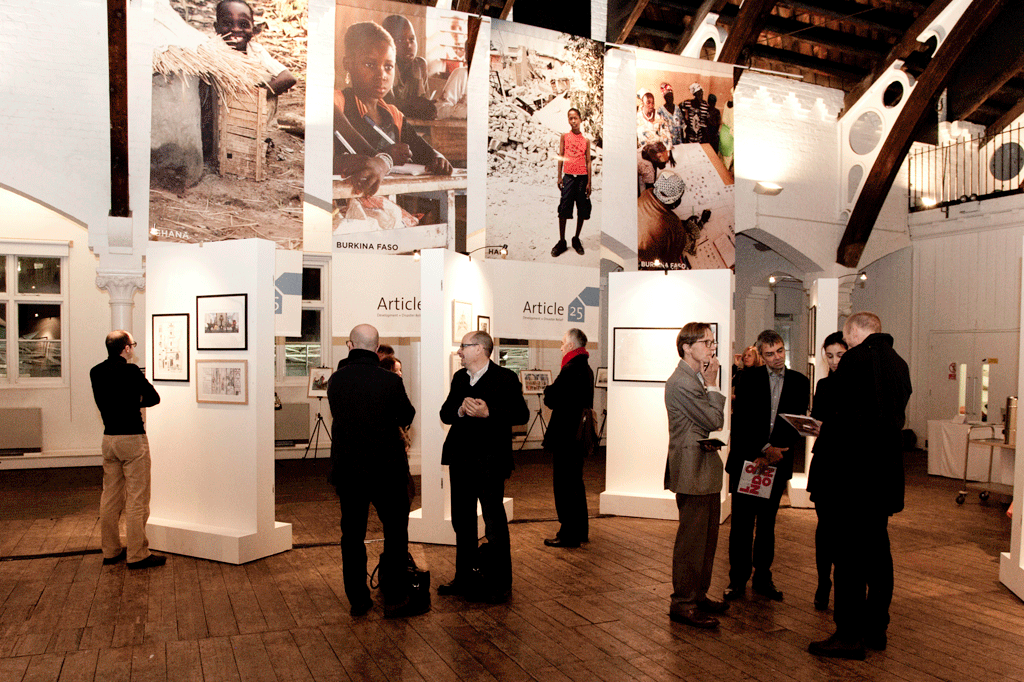Shelter is a basic human right, and one that this industry is uniquely placed to provide. Here, Jack Pringle explains the vital work that one charity is doing throughout the developing world
Article 25’s “10X10” event brought together 100 top artists, architects and engineers in the City of London in October, with each creating a drawing of their allocated square in a grid of the City.
The results, an extraordinary record of that portion of London on one day, were framed and auctioned by Sotheby’s at Argent’s German Gymnasium in King’s Cross on 1 December. Odile Decq (Britain’s favourite French architect) came from France, Norman Foster drew the Gherkin - and gave a unique model - Chris Wilkinson drew Liverpool Street Station, Ian Ritchie and Eric Parry both contributed. Ted Cullinan did a star turn at the preview, with an impromptu explanation of the genius of Hawksmoor and Wren in front of Ted’s drawing of St Paul’s Cathedral.
The auction was attended by more than 400 people, who bid to take the works away for themselves or their families. The standard of some drawings was so high that collections like the RIBA Trust couldn’t resist. All costs for the event were covered by generous sponsorship, so over £80,000 was raised, all of which went straight to the charity to be used in projects in the field. It was an evening, in the depths of a recession, that showed our professions’ humanity and generosity with both time and money.
Why? What is Article 25? What is it doing that inspires this selflessness? Named after article 25 of the Universal Declaration of Human Rights, which asserts the human right to shelter, the charity was started six years ago as the UK built environment sector’s response to the needs of developing countries and post-disaster situations. To start a charity from scratch to work on a global scale is a daunting task, but we knew the need was enormous, were determined to be action-oriented and to be professional in everything we did. Six years later and A25 has been involved in more than 50 projects in developing countries, ranging from feasibility studies to a programme of 80 earthquake-resistant houses. It has worked in Papua New Guinea, Pakistan, Afghanistan, throughout Africa and in Haiti. It is building schools, training centres, sports centres and housing. UK community groups also seek A25’s help in their work in beleaguered communities here.
The proceeds from this month’s auction will go to help to build a school in Burkina Faso with partner NGO, Giving Africa. A25 is now the leading charity of its type in the UK and one of a handful worldwide that can provide expert professional services in the field.
A25’s team is led by Robin Cross, an architect who was previously a member of Ian Ritchie’s office. He is a good designer but, vitally, is intensely practical, organised and has astute political skills. He is supported by a handful of paid professionals and a raft of volunteers who bring the team up to 30, organised into technical, educational and fundraising groups.
None of this is easy. Operating in the field can mean drawing on a wide range of skills to “get it right”, using very limited resources. Sensitivity to local cultures, religions and gender issues is essential. A25 does work with communities, not to them, and at the end of each project leaves local groups empowered to build for themselves. Success is all important. There are far too many projects that waste precious funds through lack of skill and understanding.
A25’s reputation has grown exponentially and has been recognised by the Department for International Development, the Danish and Afghan governments, as well as major partner NGOs like the the Red Cross, Save the Children, Street Child Africa and more.
In the end, it is about changing lives. A building project can become the impetus to turn around the life of an individual or a whole community. In northern Uganda, A25 is delivering a skills training centre for former child soldiers and abductees from the country’s 10-year civil war. One such victim of the war, a young woman I’ll call Alice, is now working on the construction site. Alice is intent on turning her life as a child soldier into a life as a businesswoman - she will be the first to enrol in the business management course in the new building. This is how A25 changes lives and creates a better future for some of the world’s most vulnerable.
Back to the money. Growing and well supported as A25 is, it could do a huge amount more. We need support from the whole construction industry. We need your money, we need your help. Contact us at www.article-25.org, or info@article-25.org.
Jack Pringle is a partner in Pringle Brandon and chair of Article 25



























No comments yet